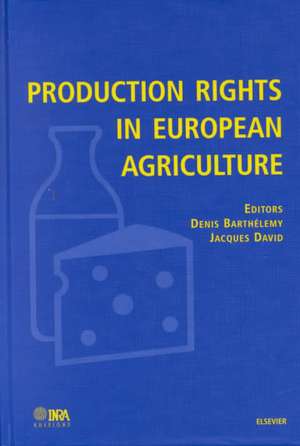Production Rights in European Agriculture
Editat de D. Barthelemy, J. Daviden Limba Engleză Hardback – 20 mai 2001
This work traces the emergence and the economic and legal content of the different income support tools for agricultural producers, collectively termed 'production rights' and it looks at the foundations of the specific national conceptions underlying the methods of organising agricultural activity.
The book is intended for a varied readership: farmers themselves, of course, but also economic, legal and tax consultants, experts, lawyers, notaries, as well as students, teachers and researchers. It has been set out in such a way as to allow readers to move freely from one subject to another, depending on whether their interest lies in economic aspects or legal developments, or whether they are more concerned by certain production rights or by certain features of their own organisation.
The goal of the book is to enable the reader to grasp the special features and the significance of the forces which have shaped the current income support instruments for producers in the various Member States of the EU, and which will unquestionably continue to influence the measures which flow from reforms to the Common Agricultural Policy in the years to come.
Preț: 1237.46 lei
Preț vechi: 1695.15 lei
-27% Nou
Puncte Express: 1856
Preț estimativ în valută:
236.85€ • 246.33$ • 198.48£
236.85€ • 246.33$ • 198.48£
Carte tipărită la comandă
Livrare economică 14-28 martie
Preluare comenzi: 021 569.72.76
Specificații
ISBN-13: 9780444508232
ISBN-10: 0444508236
Pagini: 260
Dimensiuni: 156 x 234 x 21 mm
Greutate: 0.7 kg
Editura: ELSEVIER SCIENCE
ISBN-10: 0444508236
Pagini: 260
Dimensiuni: 156 x 234 x 21 mm
Greutate: 0.7 kg
Editura: ELSEVIER SCIENCE
Cuprins
Preface (D. Barthélemy, J. David).
List of Contributors.
Introduction (D. Barthélemy, J. David).
1. Milk Quota Implementations and their Effects in the Four Main Milk-Producing Countries.
Three successive trends in Germany (D. Barthélemy).
Administrative management in favour of medium-sized farms in France (D. Barthélemy).
The costly process of intensification in the milk sector in The Netherlands (B.J.S. Hoetjes, J.-P. Boinon).
The liberal approach in the United Kingdom (J.-P. Boinon, E.H. Perkins).
The effects of national implementations on dairy farm structures (D. Barthélemy, J.-P. Boinon, P. Wavresky).
2. The Legal Basis for Milk Quotas: Widely Divergent National Interpretations.
An interpretation favouring landowners in Germany (H. Gehrke).
Ever tighter administrative control of milk quotas in France (J.-M. Gilardeau).
Blurred legal characteristics work in favour of a competitive dairy industry in the United Kingdom (M. Cardwell).
Milk quotas belong to the dairy holding in Italy (A. Germanò, E. Rook-Basile).
3. Suckler Cow and Sheep Premium Rights: a Comparative Study of France and the United Kingdom.
Suckler cow premium rights: an issue of regional importance in France (D. Barthélemy, A. Leseigneur).
A moderately liberal approach in the United Kingdom (J.-P. Boinon, E.H. Perkins).
4. A Centralised Market in Quebec versus Administrative Equivalences in France.
Market-based regulation of milk quota transfer in Québec (D.-M. Gouin).
Non-market equivalence between production rights in France (P.-A. Roussel).
5. Rights to Produce in the Light of European Law and WTO Negotiations.
Rights not anticipated in the European Union (R. Priebe).
Quotas in agricultural policy of the United States (J.W. Looney).
The future of production rights from the viewpoint of Community law and International law (L. Lorvellec).
Conclusion (D. Barthélemy, J. David).
Abbreviations and Acronyms.
Bibliography.
List of Contributors.
Introduction (D. Barthélemy, J. David).
1. Milk Quota Implementations and their Effects in the Four Main Milk-Producing Countries.
Three successive trends in Germany (D. Barthélemy).
Administrative management in favour of medium-sized farms in France (D. Barthélemy).
The costly process of intensification in the milk sector in The Netherlands (B.J.S. Hoetjes, J.-P. Boinon).
The liberal approach in the United Kingdom (J.-P. Boinon, E.H. Perkins).
The effects of national implementations on dairy farm structures (D. Barthélemy, J.-P. Boinon, P. Wavresky).
2. The Legal Basis for Milk Quotas: Widely Divergent National Interpretations.
An interpretation favouring landowners in Germany (H. Gehrke).
Ever tighter administrative control of milk quotas in France (J.-M. Gilardeau).
Blurred legal characteristics work in favour of a competitive dairy industry in the United Kingdom (M. Cardwell).
Milk quotas belong to the dairy holding in Italy (A. Germanò, E. Rook-Basile).
3. Suckler Cow and Sheep Premium Rights: a Comparative Study of France and the United Kingdom.
Suckler cow premium rights: an issue of regional importance in France (D. Barthélemy, A. Leseigneur).
A moderately liberal approach in the United Kingdom (J.-P. Boinon, E.H. Perkins).
4. A Centralised Market in Quebec versus Administrative Equivalences in France.
Market-based regulation of milk quota transfer in Québec (D.-M. Gouin).
Non-market equivalence between production rights in France (P.-A. Roussel).
5. Rights to Produce in the Light of European Law and WTO Negotiations.
Rights not anticipated in the European Union (R. Priebe).
Quotas in agricultural policy of the United States (J.W. Looney).
The future of production rights from the viewpoint of Community law and International law (L. Lorvellec).
Conclusion (D. Barthélemy, J. David).
Abbreviations and Acronyms.
Bibliography.
Recenzii
from:G. Whittaker
"...There is no doubt in my mind that this book will enthral anyone who is interested in exploring beyond the how to the why of production right function and administration. That we should all understand the how is beyond debate, in my opinion; I have discovered from other writings and in my brief acquaintance with this book that a greater knowledge of the why can help to put the how in perspective, I will certainly revisit this compilation regularly. The contributions, while being solidly and academically written, not to say exceptionally well thought out, are light enough in style for an interested person to be able to dip into this book over coffee, on the train or even as bedtime reading! ...it is an ideal vehicle for those who wish to take their knowledge of the CAP and its workings to a higher level." --The Bulletin of the Agricultural Association, Issue 27
"...There is no doubt in my mind that this book will enthral anyone who is interested in exploring beyond the how to the why of production right function and administration. That we should all understand the how is beyond debate, in my opinion; I have discovered from other writings and in my brief acquaintance with this book that a greater knowledge of the why can help to put the how in perspective, I will certainly revisit this compilation regularly. The contributions, while being solidly and academically written, not to say exceptionally well thought out, are light enough in style for an interested person to be able to dip into this book over coffee, on the train or even as bedtime reading! ...it is an ideal vehicle for those who wish to take their knowledge of the CAP and its workings to a higher level." --The Bulletin of the Agricultural Association, Issue 27












